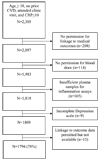Relation of inflammation to depression and incident coronary heart disease (from the Canadian Nova Scotia Health Survey [NSHS95] Prospective Population Study)
- PMID: 19268727
- PMCID: PMC2905847
- DOI: 10.1016/j.amjcard.2008.11.035
Relation of inflammation to depression and incident coronary heart disease (from the Canadian Nova Scotia Health Survey [NSHS95] Prospective Population Study)
Abstract
Numerous studies have found that depression was a strong independent risk factor for incident coronary heart disease (CHD), with increasing risk in those with higher levels of depressive symptoms. The association between measures of inflammation (C-reactive protein, interleukin-6, and soluble intracellular adhesion molecule-1), depressive symptoms, and CHD incidence was examined in 1,794 subjects of the population-based Canadian Nova Scotia Health Survey. There were 152 incident CHD events (8.5%; 141 nonfatal, 11 fatal) during the 15,514 person-years of observation (incidence rate 9.8 events/1,000 person-years). Depression and inflammation were correlated at baseline and each significantly predicted CHD in separate models. When both risk factors were in the same model, each remained significant. The association between depressed group by the Center for Epidemiological Studies-Depression scale (score > or =10 vs 0 to 9) and CHD incidence (hazard rate 1.60, 95% confidence interval 1.12 to 2.27) was not reduced by the addition of inflammatory markers to the model (hazard rate 1.59, 95% confidence interval 1.12 to 2.26). Findings were similar after adjustment for aspirin, lipid-lowering medication, or antidepressant use, and the association did not vary by gender, smoking status, age, obesity, cardiovascular medication use, or antidepressant use. In conclusion, increased inflammation explained only a very small proportion of the association between depression and incident CHD.
Figures
References
-
- Nicholson A, Kuper H, Hemingway H. Depression as an aetiologic and prognostic factor in coronary heart disease: a meta-analysis of 6362 events among 146 538 participants in 54 observational studies. Eur Heart J. 2006;27:2763–2774. - PubMed
-
- Suls J, Bunde J. Anger, anxiety, and depression as risk factors for cardiovascular disease: the problems and implications of overlapping affective dispositions. Psychol Bull. 2005;131:260–300. - PubMed
-
- Van der Kooy K, van Hout H, Marwijk H, Marten H, Stehouwer C, Beekman A. Depression and the risk for cardiovascular diseases: systematic review and meta analysis. Int J Geriatr Psychiatry. 2007;22(7):613–626. - PubMed
-
- Ridker PM, Cushman M, Stampfer MJ, Tracy RP, Hennekens CH. Inflammation, aspirin, and the risk of cardiovascular disease in apparently healthy men. N Engl J Med. 1997;336:973–979. - PubMed
-
- Ridker PM, Hennekens CH, Buring JE, Rifai N. C-reactive protein and other markers of inflammation in the prediction of cardiovascular disease in women. N Engl J Med. 2000;342:836–843. - PubMed
Publication types
MeSH terms
Substances
Grants and funding
- HL-084034/HL/NHLBI NIH HHS/United States
- HL-04458/HL/NHLBI NIH HHS/United States
- R01 HL080665/HL/NHLBI NIH HHS/United States
- UL1 RR024156/RR/NCRR NIH HHS/United States
- HL-072866/HL/NHLBI NIH HHS/United States
- P01 HL088117/HL/NHLBI NIH HHS/United States
- R24 HL076857/HL/NHLBI NIH HHS/United States
- K24 HL084034/HL/NHLBI NIH HHS/United States
- HL-076857/HL/NHLBI NIH HHS/United States
- K23 HL072866/HL/NHLBI NIH HHS/United States
- K23 HL004458/HL/NHLBI NIH HHS/United States
- HL-088117/HL/NHLBI NIH HHS/United States
LinkOut - more resources
Full Text Sources
Other Literature Sources
Medical
Research Materials


